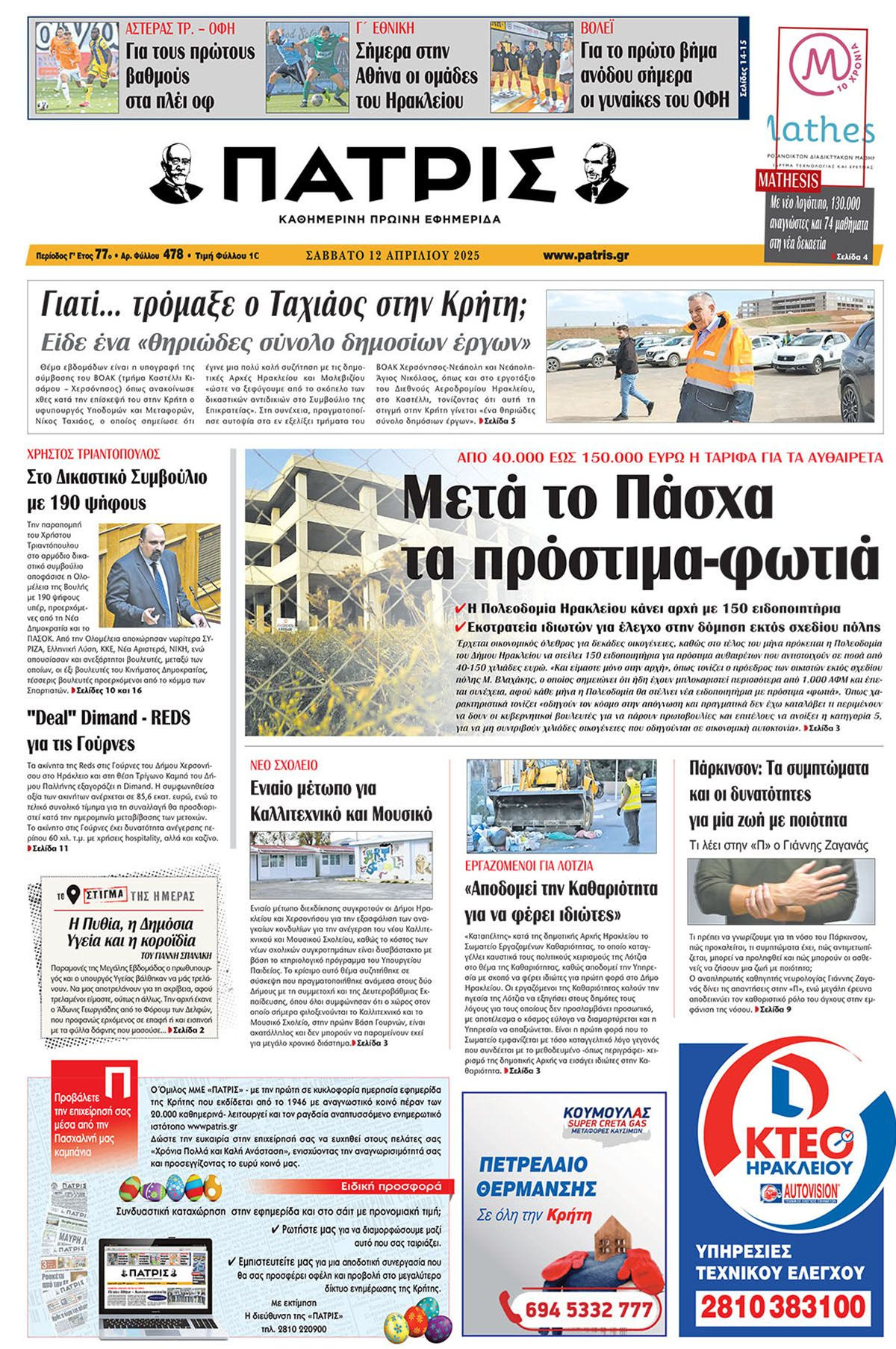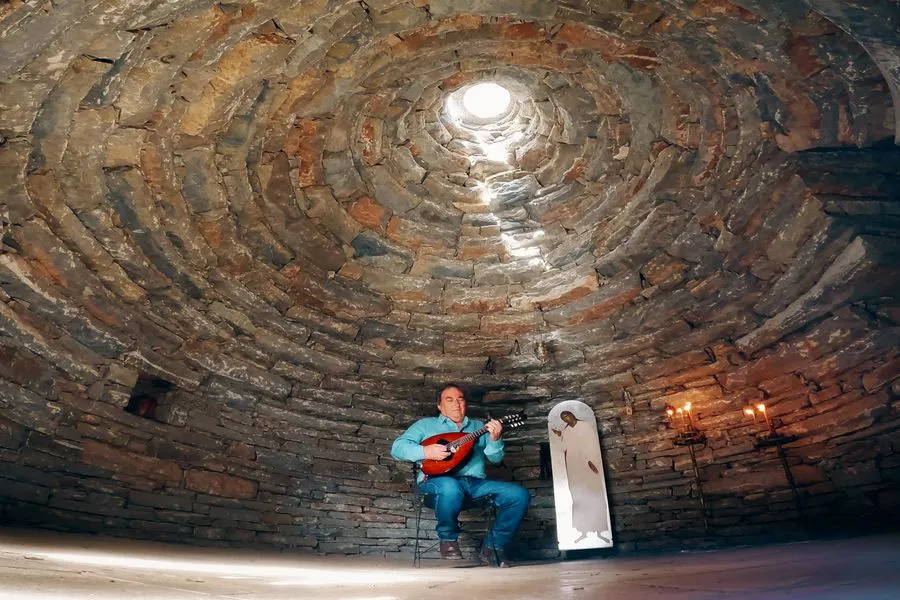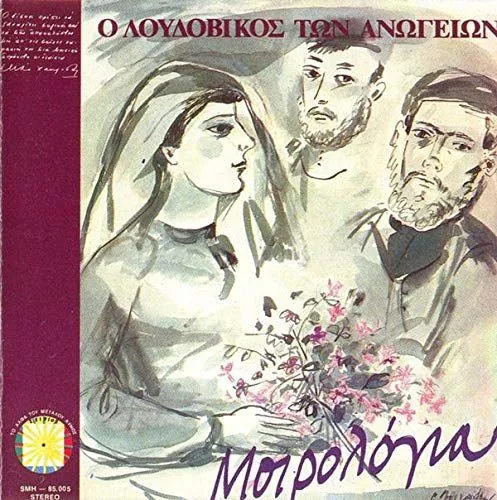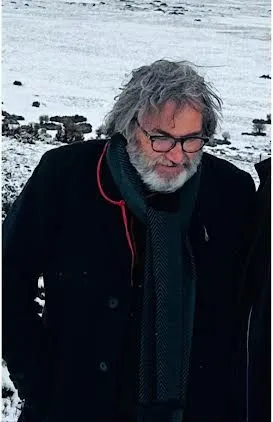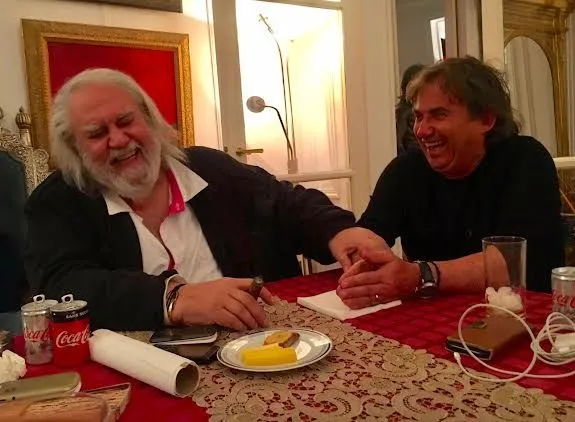It all began back in the 1970s, when a teenage Loudovikos heard a lament (moiroloi) sung by Evridiki Xylouri, sister of the legendary Psaronikos. Her voice—hauntingly similar to her brother’s—moved him deeply. He recorded her singing a mother’s lament for her son, a soldier who died in Northern Greece, and composed a melody for it. That was the spark.
He began searching the grief-soaked land of Anogeia for more laments, and what he found were songs full of sorrow and truth—each one revealing the unfiltered love and pain of a mother.
“That’s how it started,” Loudovikos recalls in his interview with Patris, ahead of his upcoming Holy Monday concert at Heraklion’s Cultural Conference Center.
“I began performing them at home, in the neighborhood, for women who invited me to play so they could cry and feel relief.”
He felt he had stumbled on something rare. When he eventually met Manos Hadjidakis, he shared the lament of Ririka, a 7-year-old girl who died without ever knowing her father. Hadjidakis was so moved, he called these songs “erotic elegies.”
“They’re not extended cries,” he said. “They’re elegant words filled with feeling.”
He helped produce an album titled Moirologia in 1985, and the rest is history.
The album’s debut, at a packed theater in Anogeia, was unforgettable. “There was barely a whisper beneath the sobs,” Loudovikos says. Another powerful memory: performing at the Iviron Monastery on Mount Athos before forty monks. “It was like facing a black horseshoe. I’ve never seen more tears in men.”
Later, during a mystical concert in Heraklion’s Basilica of Saint Mark, Loudovikos performed amidst an exhibition of Fayum portraits—ancient Egyptian funerary images. “It was like welcoming the dead with song,” he says. He also performed on the banks of the Acheron River, known in antiquity as the gate to Hades.
“Lamenting exists because it offers catharsis to the living,” he reflects. “And it honors the dead, adorning them with precious words soaked in tears.”
“The deepest pain,” he adds, quoting a woman from Anogeia, “feels like no pain at all.”
The Woman’s Voice in Grief
Why are laments mostly sung by women?
“In Crete, women didn’t sing love songs,” Loudovikos explains. “That was the man’s role. But when the man dies, the woman gives him back the song—his final tribute.”
Although rare today, laments once provided healing. “That doesn’t mean the pain is any less,” he says. “But maybe we’ve grown numb to death—we see it daily on our screens.”
Songs of Today’s Sorrow
When the Tempi train tragedy struck, Loudovikos was near the village of Velika. Deeply affected, he wrote two songs:
-
“The Mother Waits at the Station”
-
“The Bitter Almond of March”
But he doesn’t call them laments:
“You can’t write a true moiroloi unless you’ve experienced the loss yourself. Only then can the words carry deep truth.”
He references Yannis Ritsos, who wrote laments inspired by a photograph of a grieving mother. “They’re powerful poems,” he says, “but they don’t hold a mother’s pain.”
The Night at the Panathenaic Stadium
At the Kalimarmaro concert for Tempi, with over 70,000 people attending, Loudovikos opened the night.
“I was trembling. I carried a responsibility.” He shared an old story:
Water, Fire, and Honor walked together. Before parting ways, they made a pact:
“Fire, where will we find you?”
“Where you see smoke.”
“Water?”
“Where green grass grows.”
“And you, Honor?”
“If you lose me… you’ll never find me again.”The applause shook the stadium.
He adds: “That night, the truest, deepest part of the Greek soul rose to the surface.”
What He Took from the Greats
Loudovikos has been called a “storytelling songwriter,” but he says it’s all about sensitivity: “When something moves me, I make it a song, a tale, a reflection.”
Asked about the colors of pain, he answers like a poet:
“I never found the color of love—how could I find the color of pain? Each of us must discover it on our own palette.”
He has known artistic legends: Hadjidakis, Gatsos, Vangelis, Dimoula, Koundouros, and others.
“They gave me the ‘conclusions’—about beauty, art, and life. But the essence, I got from my roots. From the wisdom of simple people. That’s what shaped me.”
He even composed a kind of testament in song:
I return from life’s journey with no luggage,
A tireless pilgrim with a heart full of roads.
I saw wise men bewildered,
And simple souls answering softly…
A Night of Lament and Light – April 14
On Holy Monday, April 14 at 9:00 p.m., at the Andreas and Maria Kalokairinos Hall in Heraklion, Loudovikos will present a deeply emotional performance alongside Stella Seiragaki, Marina Dakanali, and a five-member ensemble.
The concert will be a musical and poetic journey through Cretan laments, blending raw mourning with expressions of deep love, drawn from the lived experiences of ordinary people. Accompanying the music will be a monologue by actress Emmanouela Marioula, based on the tragic sinking of the Heraklion ferry near Falkonera, where a young sailor lost his life and a mother tells the story of his loss.
It promises to be an unforgettable evening—an offering of remembrance, reflection, and reverence.

